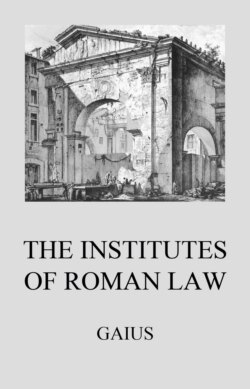Читать книгу Institutes of Roman Law - Gaius - Страница 5
На сайте Литреса книга снята с продажи.
Оглавление
EXPLANATION OF ABBREVIATIONS
Inst. Institutes of Justinian.
Dig. Digest or Pandects of Justinian.
Cod. Code of Justinian.
Nov. Novellae Constitutiones or Novels of Justinian.
The meaning of the numbers that follow these abbreviations will be obvious to any one who opens a volume of the Corpus Juris.
Pr. stands for principio, meaning, in the first paragraph of a title of the Institutes, or of a fragment of a title of the Digest, or of a ‘lex’ of a title of the Code.
The Commentaries of Gaius are referred to by numbers indicating the book and the paragraph: e.g. 2 § 5, indicates the 5th paragraph of Book 2. When the reference is to another paragraph in the same book, the book is omitted.
When Ulpian or Paulus are quoted, the works referred to are the Ulpiani Fragmenta or Excerpta ex Ulpiani Libro singulari Regularum, and the Sententiae Receptae of Paulus.
Fragm. Vat. Fragmenta Juris Romani Vaticana.
(For the Jus antejustinianum see Huschke’s or Krueger’s Collections of ante-Justinian legal writings.)
When Savigny, Vangerow, Keller, Bethmann-Hollweg, Ihering, Kuntze, Windscheid, Dernburg, Lenel, Sohm, Muirhead, and Roby are simply cited, the references are to Savigny, System des heutigen römischen Rechts; Vangerow, Lehrbuch der Pandekten; Keller, Der römische Civilprocess und die Actionen; Bethmann-Hollweg, Der römische Civilprozess; Ihering, Geist des römischen Rechts auf den verschiedenen Stufen seiner Entwicklung; Kuntze, Institutionen und Geschichte des römischen Rechts; Windscheid, Lehrbuch des Pandekten-Rechts; Dernburg, Pandekten; Lenel, Das Edictum Perpetuum, ein Versuch zu dessen Wiederherstellung; Sohm, The Institutes—A Text-book of the History and System of Roman Private Law (translated by J. C. Ledlie), 2nd ed.; Muirhead, Historical Introduction to the Private Law of Rome, 2nd ed.; Roby, Roman Private Law in the times of Cicero and of the Antonines.
